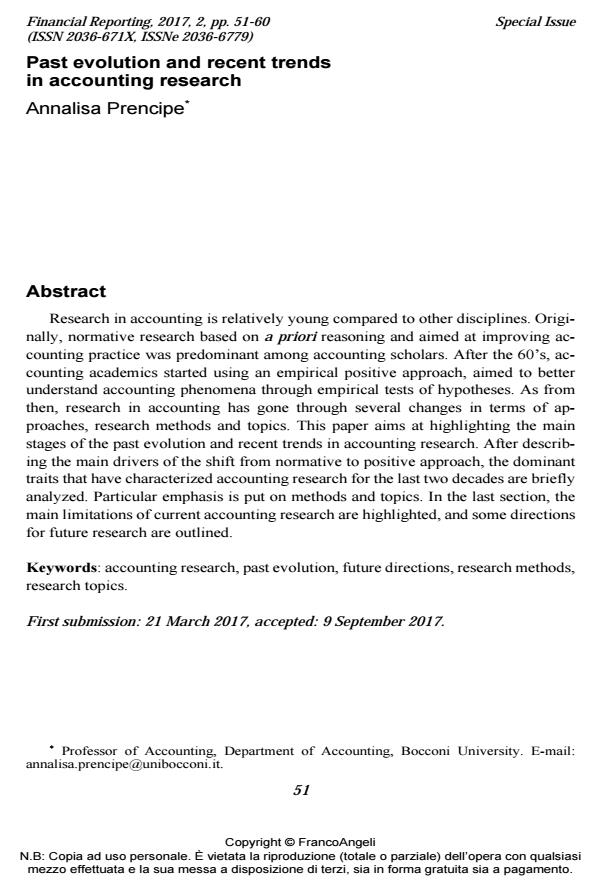Past evolution and recent trends in accounting research
Titolo Rivista FINANCIAL REPORTING
Autori/Curatori Annalisa Prencipe
Anno di pubblicazione 2017 Fascicolo 2017/2 Lingua Inglese
Numero pagine 10 P. 51-60 Dimensione file 251 KB
DOI 10.3280/FR2017-002005
Il DOI è il codice a barre della proprietà intellettuale: per saperne di più
clicca qui
Qui sotto puoi vedere in anteprima la prima pagina di questo articolo.
Se questo articolo ti interessa, lo puoi acquistare (e scaricare in formato pdf) seguendo le facili indicazioni per acquistare il download credit. Acquista Download Credits per scaricare questo Articolo in formato PDF

FrancoAngeli è membro della Publishers International Linking Association, Inc (PILA)associazione indipendente e non profit per facilitare (attraverso i servizi tecnologici implementati da CrossRef.org) l’accesso degli studiosi ai contenuti digitali nelle pubblicazioni professionali e scientifiche
Research in accounting is relatively young compared to other disciplines. Originally, normative research based on a priori reasoning and aimed at improving accounting practice was predominant among accounting scholars. After the 60’s, accounting academics started using an empirical positive approach, aimed to better understand accounting phenomena through empirical tests of hypotheses. As from then, research in accounting has gone through several changes in terms of approaches, research methods and topics. This paper aims at highlighting the main stages of the past evolution and recent trends in accounting research. After describing the main drivers of the shift from normative to positive approach, the dominant traits that have characterized accounting research for the last two decades are briefly analyzed. Particular emphasis is put on methods and topics. In the last section, the main limitations of current accounting research are highlighted, and some directions for future research are outlined.
Keywords:Accounting research, past evolution, future directions, research methods, research topics.
- Ahmed K. and Courtis J.K. (1999), Associations between corporate characteristics and disclosure levels in annual reports: A meta-analysis, British Accounting Review, 31(1), pp. 35-61,
- Ball R. and Brown P. (1968), An Empirical Evaluation of Accounting Income Numbers, Journal of Accounting Research, 6 (2), pp. 159-178, DOI: 10.2307/2490232
- Beaver W.H. (1968), The Information Content of Annual Earnings Announcements, Journal of Accounting Research, 6, pp. 67-92, DOI: 10.2307/2490070
- Dechow P., Ge W. and Schrand C. (2010), Understanding earnings quality: A review of the proxies, their determinants and their consequences, Journal of Ac-counting and Economics, 50 (2-3), pp. 334-401,
- Dyckman T.R. and Zeff S.A. (2015), Accounting Research: Past, Present and Future, Abacus, 51 (4), pp. 511-524,
- Fama E.F. (1970), Efficient Capital Markets: A Review of Theory and Empirical Work, The Journal of Finance, 25 (2), pp. 383-417, DOI: 10.2307/2325486
- Gordon R.A. and Howell J.E. (1959), Higher Education for Business. (New York: Columbia University Press).
- Grafton J., Lillis A.M. and Mahama H. (2011), Mixed methods research in accounting, Qualitative Research in Accounting & Management, 8 (1), pp. 5-21, DOI: 10.1108/11766091111124676
- Granof M.H. and Zeff S.A. (2008), Research on accounting should learn from the past, The Chronicle of Higher Education, 54 (38). pp. A34.
- Hand J.R.M. (2002), Discussion of “Earnings surprises, growth expectations, and stock returns, or, don’t let an earnings torpedo sink your portfolio”, Review of Accounting Studies, 7 (2-3), pp. 313-318, DOI: 10.1023/A:1020298607587
- Healy P.M. (1985), The effect of bonus schemes on accounting decisions, Journal of Accounting and Economics, 7 (1-3), pp. 85-107, DOI: 10.1016/0165-4101(85)90029-1
- Healy P.M. and Palepu K.G. (2001), Information asymmetry, corporate disclosure, and the capital markets: A review of the empirical disclosure literature, Journal of Accounting and Economics, 31 (1-3), pp. 405-440, DOI: 10.1016/S0165-4101(01)00018-0
- Jensen M.C. and Meckling W.H. (1976), Theory of the firm: Managerial behavior, agency costs and ownership structure, Journal of Financial Economics, 3 (4), pp. 305-360, DOI: 10.1016/0304-405X(76)90026-X
- Libby R., Bloomfield R. and Nelson M.W. (2002), Experimental research in financial accounting, Accounting Organizations and Society, 27 (8), pp. 775-810, DOI: 10.1016/S0361-3682(01)00011-3
- Oler D.K., Oler M.J. and Skousen C.J. (2010), Characterizing Accounting Research, Accounting Horizons, 24 (4), pp. 635-670,
- Pierson F.C. (1959), The Education of American Businessmen. (New York: McGraw-Hill).
- Rayburn J. (2005), President’s Message, Accounting Education News, 33 (4), (Fall).
- Rayburn J. (2006), President’s Message, Accounting Education News, 35 (3), (Summer).
- Scott W.R. (2003), Financial Accounting Theory. (Toronto: Prentice Hall).
- Spence M. (1973), Job Market Signaling, The Quarterly Journal of Economics, 87 (3), pp. 355-374, DOI: 10.2307/1882010
- Tuttle B. and Dillard J. (2007), Beyond Competition: Institutional Isomorphism in U.S. Accounting Research, Accounting Horizons, 21 (4), pp. 387-409,
- Velte P. and Stawinoga M. (2016), Integrated reporting: The current state of empirical research, limitations and future research implications, Journal of Management Control, Forthcoming,
- Watts R.L. and Zimmerman J.L. (1986), Positive Accounting Theory. (Englewood Cliffs: Prentice Hall).
- Zeff S.A. (1978), The Rise of Economic Consequences, The Journal of Accountancy, 146 (6), pp. 56-63.
- Zeff S.A. (1983), ‘A Retrospective’, The Accounting Review, 58 (1), pp. 129-34.
- Zeff S.A. (1996), A Study of Academic Research Journals in Accounting, Accounting Horizons, 10 (3), pp. 158-177.
- Zeff S.A. (2013), The Objectives of Financial Reporting: A Historical Survey and Analysis, Accounting and Business Research, 43 (4), pp. 262-327, DOI: 10.1080/00014788.2013.782237
- Zimmerman J.L. (2015), The role of accounting in the twenty-first century firm, Accounting and Business Research, 45 (4), pp. 1-25. DOI: 10.1080/00014788.2015.1035549
Annalisa Prencipe, Past evolution and recent trends in accounting research in "FINANCIAL REPORTING" 2/2017, pp 51-60, DOI: 10.3280/FR2017-002005